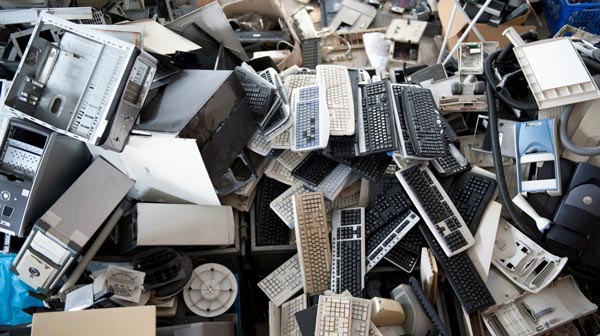R2 Certification Electronic Devices Recycling: Your Assurance for Accountable Disposal
R2 Certification Electronic Devices Recycling: Your Assurance for Accountable Disposal
Blog Article
Master the Demands of R2 Qualification to Make Certain Sustainable Business Practices
At the forefront of this activity is the R2 accreditation, an extensive criterion that sets the bar high for electronic devices recyclers and refurbishers. As businesses strive to straighten with environmentally aware techniques, grasping the demands of R2 qualification is extremely important. In a globe where sustainability is no longer a simple buzzword yet an organization necessary, diving into the intricacies of R2 accreditation is a tactical relocation that can lead the means for long-term success and positive environmental effect.
Relevance of R2 Accreditation
Accomplishing R2 Accreditation is vital for businesses intending to demonstrate their commitment to lasting and responsible electronic waste management techniques. This accreditation, developed by SERI (Lasting Electronic Devices Recycling International), establishes the standard for accountable recycling methods in the electronic devices industry. By acquiring R2 Qualification, companies signal to their stakeholders that they adhere to rigorous environmental, health, and safety laws while taking care of digital waste.
Among the crucial reasons R2 Certification is necessary is its focus on sustainability. With digital waste being a significant international issue, businesses need to display their devotion to reducing the environmental impact of their operations. R2 Qualification requires firms to execute procedures that guarantee the proper handling, repair, and recycling of electronic waste, therefore contributing to the circular economic situation and decreasing the build-up of e-waste in land fills.
In Addition, R2 Accreditation enhances a company's online reputation and integrity. In today's environmentally mindful market, companions and consumers are progressively wanting to collaborate with organizations that focus on sustainability. By accomplishing R2 Qualification, business can distinguish themselves as leaders in responsible e-waste monitoring, obtaining an one-upmanship and drawing in similar stakeholders.
Key Parts of R2 Standards

Steps to Obtain R2 Certification
To certify for R2 Accreditation, businesses need to carefully demonstrate conformity with a set of strict criteria and guidelines. The procedure of acquiring R2 Certification involves numerous crucial actions.
Following, companies need to evaluate their existing methods and procedures to determine any gaps that need to be dealt with to meet the R2 Requirement. This may involve applying brand-new treatments, purchasing training programs, or making adjustments to existing procedures. When any kind of deficiencies are corrected, companies can proceed to develop a detailed management system that aligns with the R2 requirements.
Complying with the implementation of the needed changes, services should undertake a third-party audit to confirm their conformity with the R2 Standard (r2 certification). This audit is conducted by an accredited qualification body and includes an extensive review of the company's centers, procedures, and paperwork. Upon successful conclusion of the audit, organizations can obtain look at this web-site their R2 Qualification, showing their dedication to accountable and sustainable business practices
Benefits of R2 Conformity
Businesses that abide by R2 compliance requirements can open a myriad of benefits in today's sustainable business landscape. Among the key advantages of R2 compliance is improved reliability and additional resources online reputation. By satisfying the rigorous requirements of the qualification, companies can demonstrate their dedication to responsible digital waste monitoring, which can impart trust fund amongst stakeholders, companions, and clients. R2 conformity can lead to cost financial savings via improved effectiveness in handling digital waste. By applying appropriate recycling and refurbishment techniques, organizations can lower garbage disposal costs and possibly create profits from recuperated materials. Furthermore, R2 compliance promotes environmental sustainability by ensuring that electronic waste is handled in an ecologically friendly fashion, minimizing the impact on land fills and natural deposits. This commitment to sustainability can also draw in ecologically conscious consumers and partners, providing an one-upmanship on the market. Overall, accomplishing R2 conformity not just aids services meet governing demands however likewise promotes a culture of environmental duty and functional quality.
Keeping R2 Qualification
Demonstrating an ongoing commitment to accountable electronic waste administration techniques, organizations have to concentrate on the thorough procedure of preserving R2 accreditation. Keeping R2 qualification entails regular audits, interior testimonials, and continual improvement initiatives to make sure compliance with the strict needs stated by the Responsible Recycling Practices (R2) standard. Organizations has to remain cautious in monitoring their electronic waste administration procedures, data safety actions, and general ecological performance to promote their R2 certification status.
Routine training and education for staff members are important to preserve R2 qualification, as team member need to be educated about the most up to date best techniques and market criteria. Keeping in-depth documents and documents of digital waste recycling tasks, downstream vendors, and internal procedures is vital for demonstrating conformity during audits.
Moreover, companies ought to proactively engage with their supply chain companions and vendors to make certain that all entities associated with the electronic waste administration process follow R2 criteria. By cultivating a culture of transparency, liability, and continual improvement, businesses can successfully maintain their R2 certification and promote their commitment to sustainable organization methods.
Conclusion

Attaining R2 Qualification is crucial for businesses aiming to demonstrate their commitment to sustainable and accountable digital waste monitoring techniques. By getting R2 Certification, organizations signal to their stakeholders that they adhere to rigid ecological, see wellness, and safety guidelines while handling electronic waste.
Upon successful completion of the audit, companies can obtain their R2 Accreditation, showing their commitment to sustainable and liable company practices.
Keeping R2 accreditation includes normal audits, interior testimonials, and constant improvement initiatives to make sure compliance with the rigid requirements established forth by the Responsible Recycling Practices (R2) requirement. By understanding the key components of R2 criteria, taking the needed actions to acquire accreditation, and reaping the advantages of R2 compliance, companies can show their commitment to responsible electronic waste monitoring.
Report this page